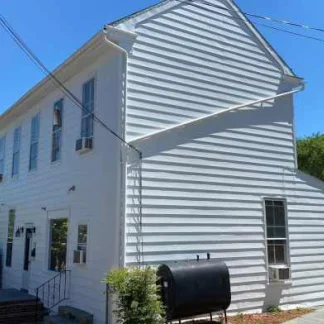Martinsburg VA Medical Center - Stephens City CBOC
Martinsburg VA Medical Center-Stephens City Community Based Outpatient Clinic is...
Lord Fairfax Community offers inpatient treatment for individuals with alcohol and/or substance addiction. The program includes aftercare planning, practical life skills, group discussion and more. Lord Fairfax Community is located at Winchester, Virginia.
The Lord Fairfax House was established in 1976 by the Council on Alcoholism Lord Fairfax Community. Theye moved to 512 S. Braddock Street in August, 1984 – opening the first co-ed transitional domiciliary available in Winchester with one client in December of that year.
Lord Fairfax Community’s halfway house is not a rescue mission nor merely a “hotel”. Rather it is a continuation of a client’s treatment program – providing a home where they can once again begin to enjoy life free of chemicals.
The primary purpose of the halfway house program is to help recovering individuals learn to live in society without drugs or alcohol. Through their program, they provide support and guidance using the 12 Step Program.
Contact us for more information: (540) 662-8877

Connect with Lord Fairfax Community by calling their admissions team directly.
(540) 662-8877 Website Get DirectionsGroup therapy is any therapeutic work that happens in a group (not one-on-one). There are a number of different group therapy modalities, including support groups, experiential therapy, psycho-education, and more. Group therapy involves treatment as well as processing interaction between group members.
In individual therapy, a patient meets one-on-one with a trained psychologist or counselor. Therapy is a pivotal part of effective substance abuse treatment, as it often covers root causes of addiction, including challenges faced by the patient in their social, family, and work/school life.
Life skills trainings involve all the skills a person must have in order to function successfully in the world. These include time management, career guidance, money management, and effective communication. Truly successful addiction recovery is based on the ability to not only live substance-free, but to thrive. Life skills teaches the practical necessities of functioning in society, which sets clients up for success in life, and therefore sobriety.
In individual therapy, a patient meets one-on-one with a trained psychologist or counselor. Therapy is a pivotal part of effective substance abuse treatment, as it often covers root causes of addiction, including challenges faced by the patient in their social, family, and work/school life.
Life skills trainings involve all the skills a person must have in order to function successfully in the world. These include time management, career guidance, money management, and effective communication. Truly successful addiction recovery is based on the ability to not only live substance-free, but to thrive. Life skills teaches the practical necessities of functioning in society, which sets clients up for success in life, and therefore sobriety.
Life skills trainings involve all the skills a person must have in order to function successfully in the world. These include time management, career guidance, money management, and effective communication. Truly successful addiction recovery is based on the ability to not only live substance-free, but to thrive. Life skills teaches the practical necessities of functioning in society, which sets clients up for success in life, and therefore sobriety.
Martinsburg VA Medical Center-Stephens City Community Based Outpatient Clinic is...
Edge Hill Retreat is located in Winchester, Virginia. Edge Hill Retreat speciali...
Northwestern Community Services – Community House is a private rehab located in ...
Bridging the Gaps is located in Winchester, Virginia. Bridging the Gaps is an in...